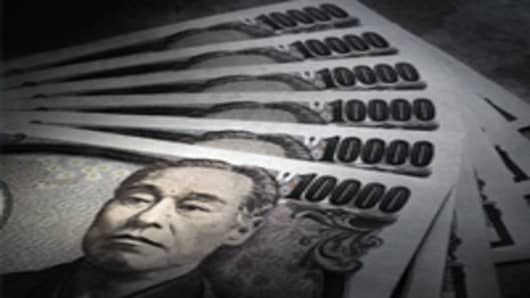While the yen fell to its lowest level in over two years on Monday on expectations the traditionally conservative Bank of Japan (BoJ) will deliver on Prime Minister Shinzo Abe's aggressive monetary policy pledge, experts fear markets may be over estimating the central bank's next moves.
Foreign exchange strategists said the currency, which has weakened 13 percent over the past three months on hopes for bold action by the central bank, is at risk of a reversal in the near-term.
"The key is whether policy action really stands up to the rhetoric in terms of what the government is trying to get them (BOJ) to commit to. My fear is that the policy actions at this meeting and perhaps the next one (in February), will fall someway short of what is necessary," Ray Attrill, co-head of forex strategy at National Australia Bank told CNBC on Monday.
The BoJ, which kicked off its two-day monetary policy meeting on Monday, is widely expected to introduce a 2 percent inflation target and raise the ceiling on its Asset Purchase Program (APP) to 111 trillion yen ($1.31 trillion) from the current 101 trillion yen, when it announces its decision on Tuesday.
(Read More:
Japan PM Says BOJ Must Set 2% Medium-Term Inflation Goal
)
"In terms of policy action to meet the inflation target, if all we get tomorrow (Tuesday) is an increase in the Asset Purchase Program by 10 trillion yen that will come as a disappointment – there will be a mismatch in terms of the rhetoric and policy steps," he said, adding that this will lead to a rise in the currency against the greenback, into the "high 80s" in the near-term.
(Read More: Could the BOJ Scrap 0.1% Rate Floor?)
In order to sustain weakness in the yen, which was trading around 90 against the greenback on Monday, the central bank would need to pledge unlimited asset purchases like the U.S. Federal Reserve, he said. In September, the Fed launched an open-ended program of asset purchases, pledging to buy $40 billion of mortgage-backed securities per month.
Market watchers say the prospects for unlimited easing in Japan will hinge on the next BOJ governor, who will replace Masaaki Shirakawa when his term expires in April 2013.
Attrill is among a growing pool of strategists that are turning cautious on the outlook for the yen, which has seen a heavy buildup in speculative short positions.
Mitul Kotecha, head of global forex strategy at Credit Agricole CIB, agrees that if the BOJ merely delivers measures in line with current market consensus, dollar-yen could fall to 87-88 level in the near-term.
"The market has already priced in the 2 percent inflation target and expansion of the APP. It's not good enough to prompt dollar/yen to move higher. You may see a case of buy on the rumor, sell on the fact, which would cause the yen to retrace some of its move up," Kotecha said.
"Dollar-yen has gone a long way built on expectations not on reality," he said.
(Read More: Yen Trades Near 2 1/2-year Low)
David Bloom, global head of forex strategy at HSBC who sees dollar-yen falling to 80 by mid-year, added that investors looking for "radical" action by the Bank of Japan this year, are setting up for a big disappointment.
"We're not convinced that the Bank of Japan will be radicalized, we're not convinced that this move up in dollar-yen will continue," Bloom said.
"There is massive speculatory positioning on the yen…as soon as the market realizes the plan the Bank of Japan has got is the same as any other central bank, and the market doesn't think its radical enough, they (investors) will all start bailing out," he added.
According to Bloom, even if the BOJ commits to unlimited monetary easing, it will not lead to a substantial fall in the yen. "Unlimited printing in the U.S. didn't cause a collapse in the dollar, why is it going to be such a negative thing and cause a collapse in the yen?"
Kotecha, however, disagreed, noting that the direction in the yen will be governed by inflation expectations.
"If you finally start to see inflation, that's sufficient enough to renew downward pressure on the yen," he said.



